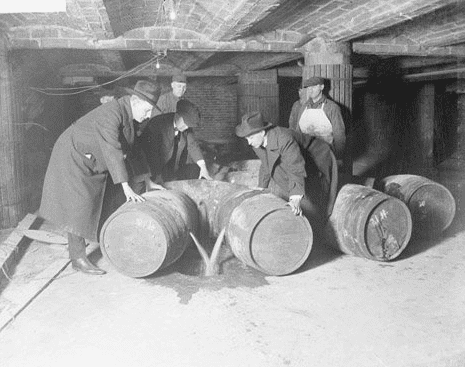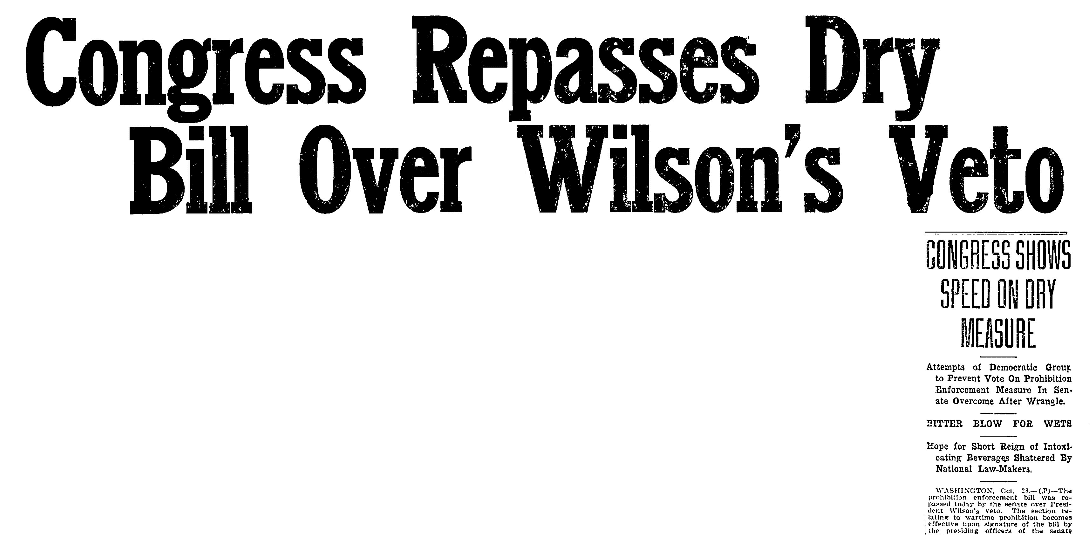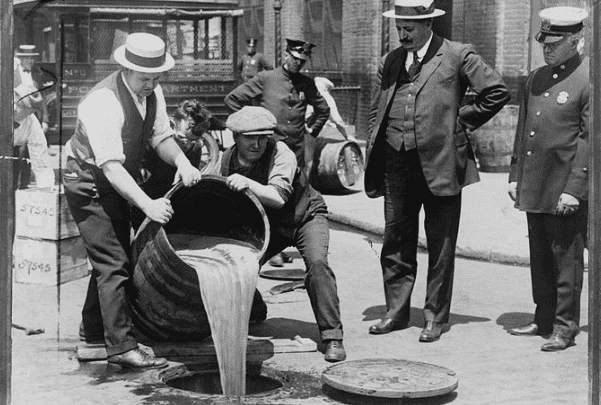Congress passed the Volstead Act on 28 October 1919, which defined “intoxicating liquors” to reinforce the Eighteenth Amendment, making Prohibition the law of the land. Formally called the “National Prohibition Act,” the Volstead Act was named for Andrew Volstead, chairman of the House Judiciary Committee, who sponsored the legislation.
However well intentioned, Prohibition turned out to be a disaster for the United States as organized crime flourished, taking over the now-illegal business of manufacturing, transporting and selling liquor. By a curious paradox, the Eighteenth Amendment did not make drinking alcohol illegal – it just made “intoxicating liquors” harder to get.

Congress’ action on Oct. 28 was indicative of the problems the Prohibition Era would foster. There was historic work for Congress to do that day – the Senate was supposed to be ratifying the peace treaty with Germany to end World War I – but the Senate tabled that important vote to argue instead over the Volstead Act; a piece of legislation to override President Wilson’s veto. Thus a day that was supposed to be devoted to peace became filled with strife.
The following two newspaper articles appeared on the day Congress acted. The first article discusses the discord in Congress. The second reveals the hypocrisy that was at the heart of Prohibition right from the very beginning.

Here is a transcription of this article:
Congress Re-passes Dry Bill over Wilson’s Veto
Congress Shows Speed on Dry Measure
Attempts of Democratic Group to Prevent Vote on Prohibition Enforcement Measure in Senate Overcome after Wrangle
Bitter Blow for Wets
Hope for Short Reign of Intoxicating Beverages Shattered by National Law-Makers
WASHINGTON, Oct. 28. – (AP) – The prohibition enforcement bill was re-passed today by the Senate over President Wilson’s veto. The section relating to wartime prohibition becomes effective upon signature of the bill by the presiding officers of the Senate and House.
The vote was 65 to 20, eight more than the necessary two-thirds majority. Before the Senate acted, announcement was made at the White House that President Wilson would annul wartime prohibition as soon as the Senate had acted on the peace treaty. That is expected to be sometime next month.
Treaty Laid Aside.
By a vote of 43 to 38 today the Senate laid aside the peace treaty temporarily to consider President Wilson’s veto of the prohibition enforcement bill.
Wartime prohibition will be brought to an end by presidential proclamation immediately after the Senate ratifies the German peace treaty, it was said today at the White House.
Officials explained that the wartime act provided that it should be annulled by the president when peace had been declared and when the army and navy had been demobilized. Congress was informed yesterday by the president in his message vetoing the prohibition enforcement bill, that demobilization of the army and the navy had been completed.
The White House announcement clears up any doubt as to whether the war would be ended legally with the ratification of the German treaty. Some officials had expressed the opinion that the war emergency would not pass until the treaty with Austria had been enacted upon by the Senate.
Wrangle over Rules.
An effort to have the Senate act on a motion to re-pass the prohibition enforcement bill over President Wilson’s veto, as was done in the House late yesterday, was made soon after the Senate convened today. Several Democrats objected and a long parliamentary wrangle over the rules ensued.
When the bill was received from the House, Senator Sterling, Republican, South Dakota, who had charge of the measure when it passed the Senate, asked unanimous consent for its immediate consideration. Senator Robinson, Democrat, Arkansas, objected and then Senator Sterling moved that the Senate, which was in open session for debate on the peace treaty, proceed to legislative business.
Objection to laying aside the treaty was made by Senator Hitchcock, of Nebraska, the administration leader who has opposed prohibition measures in the past. Although Senator Sterling said he was sure the bill’s disposition would require but a very short time, Senator Hitchcock urged that debate on the treaty continue, declaring the people were beginning to believe the Senate was deliberately delaying the treaty.
Motion Debatable.
Senator Nelson, Republican, Minnesota, chairman of the Senate Judiciary Committee, endeavored to cut off discussion by declaring Senator Sterling’s motion non-debatable. Republican Leader Lodge and Senator Smoot, Republican, Utah, also quoted rules declaring the prohibition bill was privileged.
Senator Lenroot, Republican, Wisconsin, who was presiding temporarily, ruled that the Sterling bill was debatable.
Senator Borah, Republican, Idaho, remarked that as a result of President Wilson’s statement on the coal strike and his prohibition veto message, “he was utterly bewildered” as to the ending of the war.
“The president’s statement to the miners declared the war is not ended and their contracts are in effect,” said Mr. Borah, “while this message declares the war is closed.”
“War Is Over.”
Senator Underwood said the war was over and that in good faith war prohibition should be ended. He conceded, however, that opponents of the bill would be overridden, declaring the Senate was “not going to defy the organized prohibition sentiment in this country.”
Efforts to lay aside the treaty temporarily were criticized by Senator Underwood, who said he was opposed to “putting anything in front of this treaty.” Present unrest in this country, he said, was due to the Senate’s failure to act on the treaty.
Senator Sterling resented the suggestion that he brought up the prohibition bill to delay the treaty, declaring he acted because of the prompt vote in the House to override the veto. Discussing the merits of the bill, Senator Sterling said nothing had met with such general approval as rejection by Congress of [the] president’s request to repeal the wartime law insofar as it affected light wines and beer.
Here is a transcription of this article:
Dry Congressman Not Consistent on Liquor Position
Voted for Dry Nation but Has Enough Whiskey on Hand to Slake Thirst of His Visitors
Walter Nesbit of this city, who has just returned from the strike conference, in Washington, tells of an occurrence which happened while he was there concerning a constituent with a thirst and an Illinois congressman who is a staunch exponent of the dry cause.
The miner is fond of a nip now and then. At Buffalo, Cleveland and Philadelphia he had been able to purchase his requirements but Washington’s bone dry system was too deep for him to fathom. As a last resort he decided to “call on his congressman.” The oasis had at last been found. The congressman took his caller and two friends to his home where he “set ‘em up” to two or three shots of real bottled in bond. Before bidding his constituent farewell he tucked a quart into his pocket to last him the remainder of his stay in Washington.
The name of the same congressman was among the list of those who voted for the passage of the prohibition enforcement act over the President’s veto Monday.
Note: An online collection of newspapers, such as GenealogyBank’s Historical Newspaper Archives, is not only a great way to learn about the lives of your ancestors – the old newspaper articles also help you understand American history and the times your ancestors lived in, and the news they talked about and read in their local papers. Do you have any family stories about the era of Prohibition? Please share your stories with us in the comments section.
Explore over 330 years of newspapers and historical records in GenealogyBank. Discover your family story! Start a 7-Day Free Trial
